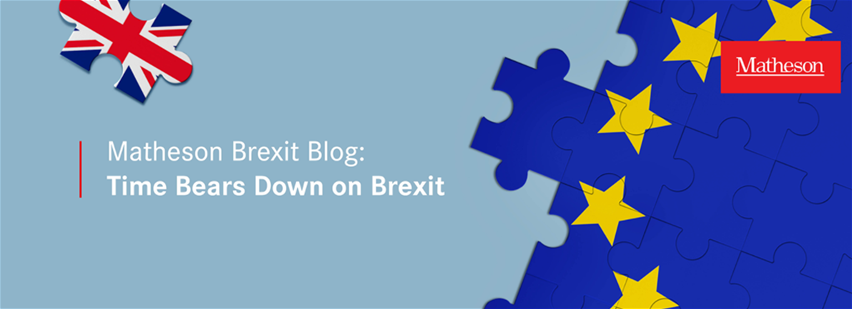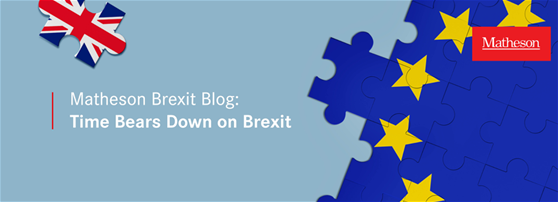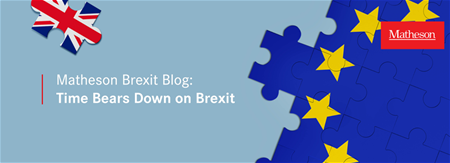Brexit Blogs
The United Kingdom left the European Union on 31 January 2020. In our regular Brexit Blog, Matheson partners will keep you up to date by reviewing the negotiations on the future relationship of the EU and the UK as these unfold.
Matheson Brexit Blog: Time Bears Down on Brexit

What had been twelve months away, before completion of the withdrawal period, is now less than six. Time is bearing down, in ways that will significantly shape the ultimate outcome. The EU Council meeting in June, preceded by a high-level meeting between the UK Prime Minister and EU institutional leaders (the presidents of the EU Council, Commission and Parliament) heralded an accelerated work programme, noting that “new momentum was required”. So while little has happened and time passes, there is a discernible change in pace. The UK is not seeking an extension, but there is more diligence than belligerence from both sides now.
Some sense of that diligence was evident at the second meeting of the EU-UK Joint Committee on 12 June. Leading for the EU, Commissioner Šefčovič referred to “some positive results”. Since its first meeting, five of the intended subcommittees including one on the Northern Ireland Protocol have begun work. “With some six months to go”, Commissioner Šefčovič noted, “we still have lots of work to do”. The “window of opportunity” is in his view “rapidly closing”.
He is right. The UK’s Command Paper in May, which saw “no need to construct any new bespoke customs infrastructure in Northern Ireland”, has ameliorated. The EU view is that on the Protocol the UK need to move on from “aspiration to operation – and fast”. The gap was illustrated subsequently in the House of Commons Northern Ireland Committee. The lead UK minister on Brexit, Michael Gove MP, assured members that, “if you are making shirts in Magherafelt and you want to send them to any other part of the United Kingdom, the situation after 1 January 2021 will be exactly the same as it is now”. When pressed as to whether this understanding was agreed with the EU, including specifically on the need for an exit declaration on goods, Mr Gove said the Committee would have to ask Mr Barnier. However, in response to a leaked document the UK Government confirmed on 7 July that it had submitted applications to the EU to create Border Control Posts (BCPs) at Northern Ireland's ports.
Northern Ireland goods sales to Great Britain are worth £8.1 billion, with goods purchases worth £10.5 billion. Together that trade comprises 56% of Northern Ireland’s total external trade in goods - by far and away its largest market.
There is a view, however, that the UK is now engaged in moving towards implementation of the Protocol. That includes putting in place necessary checks and controls for goods entering Northern Ireland from Great Britain and applying EU rules on customs and sanitary and phytosanitary protection. The Joint Committee will meet again in September.
If some progress on Northern Ireland seems tangible, the bigger picture looks different. Last week, the chief negotiators on the future UK-EU relationship, David Frost and Michel Barnier, together with a number of experts, met in person for the first time since March 2020 for a restricted negotiating round, between full rounds. These sessions in Brussels broke up a day earlier than expected with few signs of movement between the two sides. David Frost’s statement, echoing Michel Barnier’s, reflected the “significant differences that still remain between us on a number of important issues”. Michel Barnier’s thoughts had previously been amplified in his speech to the Eurofi General Assembly on 30 June. He reiterated then there cannot be equivalence for insurance, commercial bank lending or deposit-taking. Further, the EU will only grant equivalences in those areas where it is clearly in its interest to do so. On the nature of any trade agreement that might be arrived at, future cooperation should be voluntary and based on trust, he emphasised. The UK in his view wants to severely limit the EU’s regulatory and decision-taking autonomy while trying to keep as many Single Market benefits as it can. The UK proposals, Michel Barnier said “are unacceptable”. This is the gap in negotiations that remains to be closed and the political pressure that surrounds a final deadline.
On fisheries, there are signs that Michel Barnier is prepared to seek greater latitude from the EU coastal states to facilitate a deal. What the EU is unlikely to agree to is the UK demand for negotiations on quotas every year. While a move-on from the status quo, which effectively traps the UK within the Common Fisheries Policy is possible, a longer term deal, spanning several years is more likely to be acceptable. The politics of fish and the symbolism of control over territorial waters are more charged emotionally than the economic profile of the industry indicate. "The EU wants the status quo, the UK wants to change everything", Michel Barnier said on 5 June. "If we want an agreement we have to discuss somewhere in between these positions".
On the level playing field the EU will have to move a little, and the UK a lot, to close the gap. The UK will have to accept the principle of non-regression on standards and that any agreement is enforceable, leading eventually to penalties. This ultimately will increase the pressure from the EU side for a role for the ECJ. Something which the UK has effectively accepted in relation to Northern Ireland and citizens’ rights.
The second half of the year coincides with the German presidency of the EU and a continuing COVID crisis. They are set to concentrate on resolving negotiations on the EU budget 2021 – 2027 in the first instance. This means that Brexit will again come into focus from September. It is then that the real pressure of time will come to bear. Both sides want a deal. However, for one to be delivered, potentially enormous compromises will be required, especially of the UK. The later it goes, and this will go down to the wire, the more costly it will be to walk away. Meetings will continue in Brussels next week, ahead of the formal round five of negotiations commencing on 20 July.
If you would like to know more about Matheson’s Brexit Advisory Services, please contact michael.jackson@matheson.com, tara.doyle@matheson.com, liam.flynn@matheson.com, sharon.daly@matheson.com, your usual Matheson contact or any member of our dedicated Brexit Advisory Group.
Useful Links:
EU Statement, Michel Barnier, 2 July 2020
UK Statement, David Frost, 2 July 2020
Speech by Michel Barnier to the Eurofi General Assembly, 30 June 2020
EU-UK Statement following the High Level Meeting, 15 June 2020
Command Paper on The UK’s Approach to the Northern Ireland Protocol


Leave a comment